What stroke of prescience brought two Sam Shepard plays to London in the very month America voted for Trump? The kind of people we’re learning to call the disenfranchised have been Shepard’s focus for the last 40 years, and now they’re global news. In Fool for Love (which there’s still time to catch at the pop-up venue Found III) he exposed the grubby truth behind the working-class alpha-male ideal. In Buried Child (which won a Pulitzer on its first outing in 1978) he turned his X-ray gaze on the traditional American family.
The USP of this revival is its casting, with Ed Harris, Hollywood regular and star of HBO’s Westworld, making his London stage debut alongside his real-life wife Amy Madigan. Exchanging his stetson in Westworld for a grimy baseball cap, Harris plays Dodge, the ruined patriarch of a once-thriving Illinois farm who now malingers on the farmhouse couch in a nicotine haze, one eye on the TV and the other on his secret stash of whisky. It’s decades since the farm produced any crops, the house leaks, and Dodge and his wife Halie communicate from different floors.
Brace yourself for a bumpy ride and queue for a seat
Disputing the merits of their deceased son and blaming the family dysfunction on their two surviving ones takes on a grotesque circularity. As thriller material, this is a non-starter: the cat’s out of the bag in the title. But it’s fertile soil for Shepard’s gothic brand of psychodrama. We know from the off that there’s a baby interred in the back yard and, although all the while nobody in the household is willing to talk about it, that poisoned knowledge is destroying each family member in turn.
The damage is overt and physical in the case of Bradley (Gary Shelford), the embittered younger son who lost his leg in a chainsaw accident. He has developed an obsessive interest in attacking his father’s head with electric hair clippers – and this isn’t the weirdest thing we see him do in the course of the play. The damage is internal in the case of the other son Tilden, a distracted man-child who has returned to the parental home to potter outside digging up vegetables (despite his parents’ insistence that none is growing there: the play is big on symbols). The damage is flatly denied in the case of the boys’ vital, acid-tongued mother, specialist in rose-tinted family history and actively engaged only when out at her local church where she's keen on the priest.
Her energy, so contrasted with the rest of this moribund crew, at first makes her seem reasonable, and Madigan calibrates this false impression in acting of some subtlety. What are we to make of the fact that she leaves the house in one outfit (black, funereal) only to return the next day in another (bright, floral)? It’s that the curse is beginning to lift, with the intrusion of two outsiders who demand to know what has happened to this family.
The intruders are grandson Vince (Jeremy Irvine) and his college girlfriend Shelly (Game of Thrones' Charlotte Hope, both pictured below) on an impromptu road trip out of town. Having not seen his grandparents for six years, Vince is eager to re-engage with family and impress Shelly with their cosy traditional ways. Some chance! Both are appalled by the squalor in the house and shocked to find that none of its occupants recognises Vince (not even when he performs his childhood party trick of playing tunes on his teeth). Yet it is liberated, outspoken Shelly who dares to challenge them, and gradually prise the family skeleton out of the closet.
 The process generates a string of excruciatingly comedic moments (some of them involving Bradley’s prosthetic leg) which director Scott Elliott has crafted with a deft hand. This is detailed ensemble work in which each member of the cast – right down to the local priest (Jack Fortune), a late entrant in the moral scrum – has a nuanced relationship with the other. The shifting alliances in the power struggle are gripping.
The process generates a string of excruciatingly comedic moments (some of them involving Bradley’s prosthetic leg) which director Scott Elliott has crafted with a deft hand. This is detailed ensemble work in which each member of the cast – right down to the local priest (Jack Fortune), a late entrant in the moral scrum – has a nuanced relationship with the other. The shifting alliances in the power struggle are gripping.
Where some of the acting falls short is in its grasp of the poetry in Shepard’s writing, a silver thread that intermittently glints in the moral mire. This is where Ed Harris shines. In a rasp of a voice that seems to issue from cancered lungs, in a soliloquy near the end of the play he itemises every piece of farm equipment in his barns, from the John Deere harvester right down to the halters and hammers. It’s a list that becomes a litany, an ode to a once-productive life, and a masterclass in quiet acting.
Buried Child is a play that’s over-written. It doesn’t need the third, deceased son. And it doesn’t need the references to other American classics (Tilden’s desire to stroke Shelly’s fur jacket, for one, just like Steinbeck’s Lenny). Subtler and truer is its kinship with Greek tragedy – Oedipus Rex, Agamemnon – in addressing issues of family guilt and shame and inheritance. This it does with a thoroughness and complexity that aligns Shepard with Eugene O’Neill. Brace yourself for a bumpy ride and queue for a seat. Harris alone is worth the ticket.
- Buried Child is at Trafalgar Studios until 18 February 2017
- Read more theatre reviews on theartsdesk




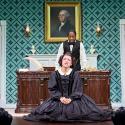



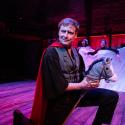

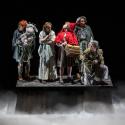
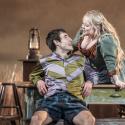


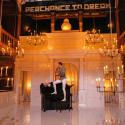
Add comment